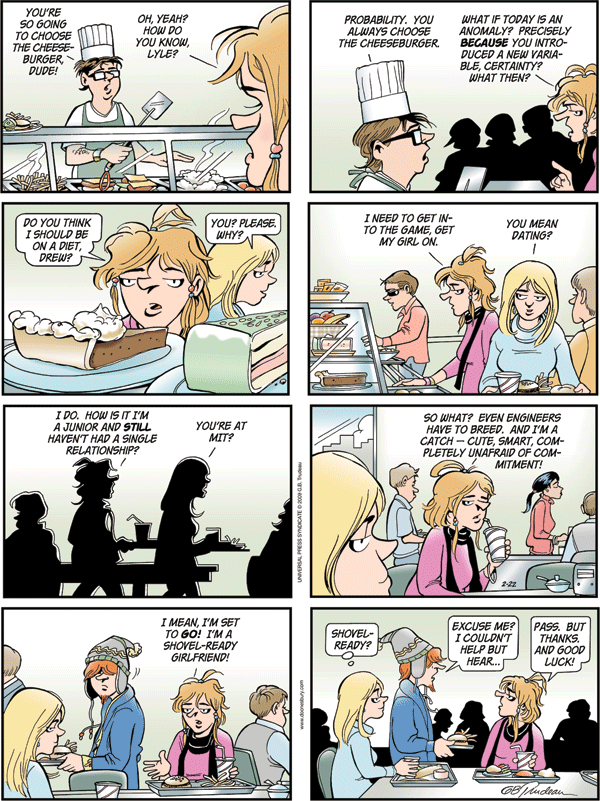Dig it
« previous post | next post »
Shovel-ready, Ben Zimmer's victorious nominee for "most likely to succeed" in the ADS WOTY competition, is clearly gaining ground:
February 22, 2009 @ 8:48 pm · Filed by Mark Liberman under Linguistics in the comics
« previous post | next post »
Shovel-ready, Ben Zimmer's victorious nominee for "most likely to succeed" in the ADS WOTY competition, is clearly gaining ground:
February 22, 2009 @ 8:48 pm · Filed by Mark Liberman under Linguistics in the comics
Powered By WordPress

mollymooly said,
February 23, 2009 @ 9:14 am
I first came across the word "shovel-ready" 5 minutes ago, in this week's "Economist".
[(myl) According to the NYT site search, it occurred in their pages 30 times during the past six months. Lexis-Nexis finds 457 hits in "Major U.S. and World Publications" in the past six months, compared to (say) 330 for "flu shots" in the same sources over the same period. For some further commentary, see Manuel Roig-Franzia, "The Obama Buzzword That Hit Pay Dirt", WaPo 1/8/2009.]
Nathan Myers said,
February 23, 2009 @ 7:44 pm
I've been barraged by "shovel-ready" since talk began of a "stimulus" to try to keep the U.S. from plunging too directly headlong into an economic meltdown that will reveal the Great Depression as Small Potatoes. For those not engaged on Keynesian economics, budgeting for "shovel-ready" projects is supposed to allow big economic transactions (that will lead to large numbers of small transactions, and so on) to occur more or less immediately, and not only after years of design, planning and negotiation, so that the slide into the Millennial Depression be somewhat more stately and, perhaps, bottom out with somewhat less calamitous conditions.
Ideally, once recovery has started we won't have bridges collapsing under us for neglect, and we will be able to benefit (by driving on them) over the decades it takes to pay down the debts incurred. An alternative is to build bombs and apparatus to deliver them to the premises of somebody we don't like, but the results are hard to enjoy, over the course of decades, as much as a bridge. My daughter still enjoys the Berkeley Rose Garden, a piece of exquisite WPA stonework remaining from the last Depression.
mollymooly said,
February 24, 2009 @ 1:45 pm
Another example of the Recency Illusion; it was used in The Economist as long ago as November. Lexis-Nexis gives 52 UK uses, including a few false positives. Most are in quotes and stimulus-package-specific. As UK importer, I nominate Councillor David Hando used it last month about a planned school in Newport, Wales.
Manuel Roig-Franzia's "But what the heck does this mean, and where does shovel-ready come from? […] Could this be a made-up word?" seems like pointless concern. The meaning is obvious in context, and it has the telltale hyphen of a temporary compound. And aren't all words made up?
bread & roses said,
February 24, 2009 @ 2:43 pm
Molly, I think that's only recency illusion if you assert that because you encountered it 5 minutes ago, that's when it was invented. Surely there must be a first encounter for every word and usage, and it happens at different times for different people.
Shovel-ready has already aged in my vocabulary; my relatives were complaining about their aches and pains and infirmities, and my aunt said "any minute now we'll be shovel-ready". So now "shovel-ready project" sounds to me like a project that is done for and ready to be buried, already.
mollymooly said,
February 24, 2009 @ 7:30 pm
I was asserting that, because the only time I remember encountering it was five minutes ago, that's when I actually did first encounter it. I realize this is not quite the standard meaning of "recency illusion", but I think the same psychology is at work.
I read "The Economist", so I am sure I would have encountered "shovel-ready" in it in November. I speculate that the reason I have no memory of that is because I took the term to be, not a real-world neologism, but rather the kind of nonce-coinage that The Economist and many periodicals sprinkle through their copy. It did not give me pause, as it did Manuel Roig-Franzia, until my attention was explicitly drawn to it by this blogpost.
While "shovel-ready" appeared in quotes in November's Economist, I suppose I interpreted these as a writer's apology for coining rather than a writer's quoting an unspecified source. As I've said before, quote-marks are doing too many different jobs.